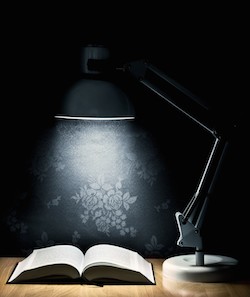 Quick Hits are short posts putting research or outside articles in the context of ergonomics.
Quick Hits are short posts putting research or outside articles in the context of ergonomics.
We’ve covered in detail the amazing ways light can affect your body, but new research (h/t) shows that as little as 2 milliseconds of light can have a huge effect on your hormones and sleep.
The researchers studied 13 people over 16 days, splitting the subjects into two groups. One group slept in total darkness, and the other group was exposed to 2 millisecond long flashes of bright white light.
From the authors:
Subjects exposed to the flash sequence during sleep exhibited a delay in the timing of their circadian salivary melatonin rhythm compared with the control dark condition (p < 0.05).
Melatonin is intended to rise as we near bedtime, and fall as we wake up in the morning, as depicted in this graph:

The natural circadian rhythm of melatonin and cortisol (click image to enlarge) [img credit]
Despite the robust effect on circadian timing, there were no large changes in either the amount or spectral content of sleep (p values > 0.30) during the flash stimulus. Exposing sleeping individuals to 0.24 sec of light spread over an hour shifted the timing of the circadian clock and did so without major alterations to sleep itself.
Exposing the subjects to the flashing light didn’t immediately disrupt their sleep – instead, it sent the message to their brains that they should go to sleep later the following night. This can have huge effects on health and happiness, increasing the risk of major illness, disease, and depression.
How to Protect Your Circadian Rhythm
This stresses the importance of avoiding white light after sunset – which means somehow turning your evening light sources orange, and keeping your bedroom as dark as possible when you’re sleeping. Consider removing LED clocks from your nightstand and even purchasing or constructing blackout curtains.
The Possibility of Neat Interventions for Good
If extremely short durations of white light when your body expects dark can seriously throw your circadian rhythm, it stands to reason that relatively little exposure to white light, orange light, or darkness at the right time could be used to reset your circadian rhythm and promote health.
Users of (currently absurdly expensive) morning blue light lamps report feeling more energetic and awake after use, so the precedent is there. Perhaps with more information about an individual’s sleep patterns, modern technology could allow us to set the circadian rhythm completely independent of natural light. Pretty neat stuff.
The post Quick Hits: New Study Literally Shines Light on Circadian Rhythm Alignment appeared first on Quitting Sitting.




















